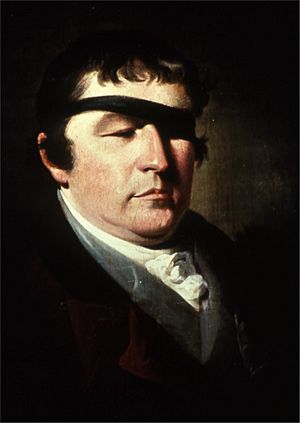Edward Rushton facts for kids
Edward Rushton (1756–1814) was a British poet, writer, and bookseller from Liverpool, England. When he was young, he worked as a sailor on a ship that carried enslaved people. This experience made him a strong supporter of ending slavery, known as an abolitionist. Later, after he lost his own eyesight, he started a school for blind people. This school is the oldest of its kind that is still open today.
Contents
Edward Rushton's Early Life
Edward Rushton was born in Liverpool, England, on November 13, 1756. He went to the Liverpool Free School from age 6 to 9. When he was 11, he started working as an apprentice for a company called Messrs. Watt and Gregson. This company traded goods in the West Indies.
Life as a Sailor
Rushton quickly became a skilled sailor. When he was 16, he bravely took control of a ship that the captain and crew were ready to leave behind. He guided the ship safely back to Liverpool. Because of this, he was promoted to a higher position on the ship.
At 17, he was on a ship carrying enslaved people that sank while returning from Guinea. He survived this event. Working on ships that transported enslaved people showed Rushton how terribly they were treated. This experience made him want to end slavery.
In 1773, Rushton was sailing to Dominica with enslaved people when many of them became very sick with an eye disease called ophthalmia. The disease spread fast. Rushton was shocked by the bad conditions. He secretly gave the enslaved people food and water. He also spoke out against the captain's actions. Because of this, he got the eye disease himself and became completely blind in one eye. His other eye also developed a problem that made it hard to see.
Fighting for Freedom in Liverpool
Because he could not see well, Rushton could no longer be a sailor. He moved back to Liverpool and lived with his sister. His father helped him financially. Rushton hired local boys to read to him every week. Through this, he learned a lot about politics and ideas. He started writing about these topics by telling the boys what to write down.
His first poem, The Dismembered Empire, was published in 1782. In this poem, he criticized British leaders. Rushton also wrote letters to his heroes, George Washington and Thomas Paine. He asked them why they were not using their power to speak out against slavery. However, neither of them replied.
Rushton married Isabelle Rain in 1784. His father tried to help him open a tavern, but Rushton was not good at that kind of work. He kept writing instead. He continued his fight against the slave trade with a poem called The West Indian Eclogues, published in 1787. Rushton used his own experiences from the slave trade and his time at sea to inspire his writing. His poems became popular, and he became known as a strong abolitionist writer. Even Thomas Clarkson, another important abolitionist, personally thanked Rushton for his help in the movement to end slavery.
Soon after The West Indian Eclogues was published, Rushton became the editor of the Liverpool Herald newspaper. However, his time there was short because of his strong beliefs. When his partner suggested he change a very strong article he had written, Rushton quit. This event inspired his poem Will Clewline. He also tried to become a bookseller, but his outspoken views only made him more enemies. Rushton did not try to hide his strong opinions about the French Revolution or the social problems in Britain.
Helping Blind People
Eventually, Rushton earned enough money from bookselling to live comfortably and send his children to school. In the late 1780s, he joined a literary and philosophical group. He started giving money to help blind people who were poor. This led Rushton to create the Liverpool School for the Indigent Blind. It opened in 1791 and was the second school of its kind in the world, after a school in Paris. Today, this school is known as The Royal School for the Blind, Liverpool.
In 1807, Rushton had an operation that helped him see again. For the first time in 33 years, he could see his wife and children. In 1811, his wife Isabella and one of his daughters passed away. Rushton died on November 22, 1814, in Liverpool, England.
Edward Rushton's Writings
- 1782 – The Dismembered Empire
- 1787 – West-Indian eclogues
- 1788 – Neglected genius: or, Tributary stanzas to the memory of the unfortunate Chatterton
- 1797 – Expostulatory Letter to George Washington, of Mount Vernon, in Virginia, on his continuing to be a proprietor of slaves
- 1800 – Lucy's ghost. A marine ballad
- 1801 – Will Clewline
- 1806 – Poems
- 1824 – Poems and Other Writings, edited by William Shepherd.
Edward Rushton's Legacy
Edward Rushton was a character in "The Dark," an interactive art display at the Science Museum in London in 2004. This display was a special sound environment where visitors could "experience life on board a slave ship in the 18th century." Since 2012, "The Dark" is also available online. In March 2016, a play called Unsung premiered at the Everyman Theatre in Liverpool. This play tells the story of how Rushton's friendship with a former enslaved African person changed his life.
See also
- List of 18th-century British working-class writers
- List of abolitionist forerunners
 | Georgia Louise Harris Brown |
 | Julian Abele |
 | Norma Merrick Sklarek |
 | William Sidney Pittman |


